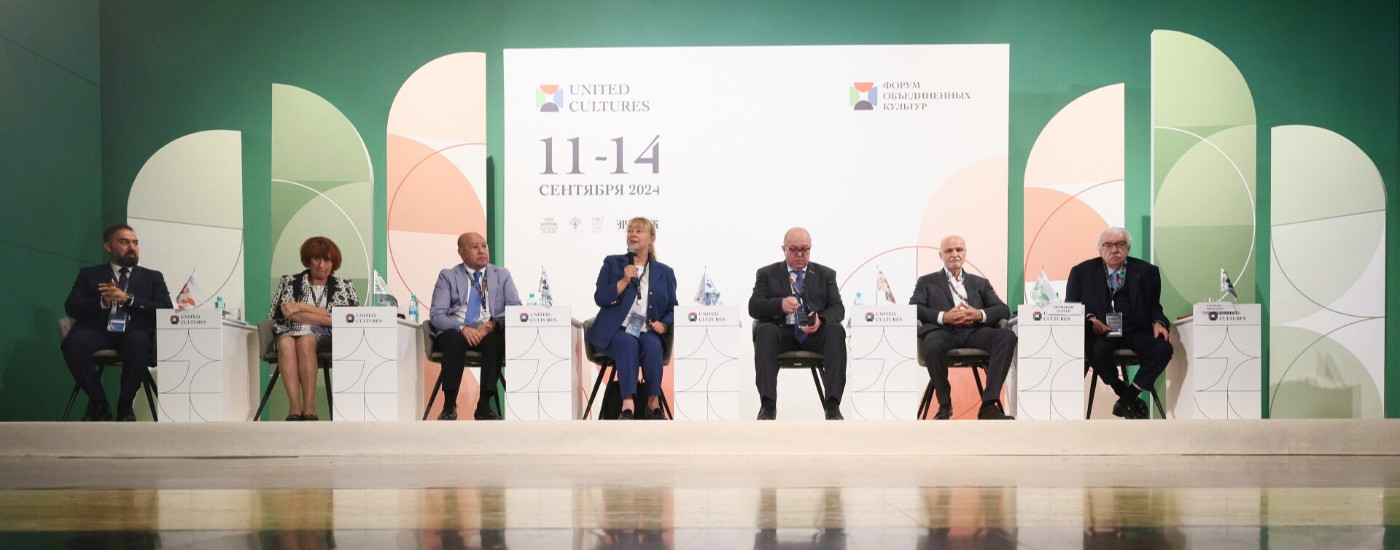The discussion focused on developing ethical standards for using artificial intelligence in media, creating a professional code for bloggers, and journalistic ethics in covering cultural events. These topics were explored during the "Media Culture" thematic section of the X St. Petersburg International United Cultures Forum.
The panel discussion "Media Culture: The Boundaries of the Permissible" was held at the General Staff Building of the Hermitage as part of the Forum's anniversary. Experts in the field of media culture and representatives of mass media from Russia, Belarus, Azerbaijan, and Turkey discussed the ethics of journalism in covering cultural events, the creation of ethical standards for AI in media, and the development of a professional code for bloggers and the interaction between media and culture.
The discussion featured the participation of Elena Vartanova, Dean of the Faculty of Journalism at Lomonosov Moscow State University; Yadviga Yuferova, Deputy Editor-in-Chief of Rossiyskaya Gazeta; Sergey Shumakov, Deputy General Director of VGTRK and Editor-in-Chief of the Main Editorial Office of the Russia-Kultura TV channel; Dmitry Zhuk, Director and Editor-in-Chief of the Belarus Today publishing house, and Deputy Chairman of the Standing Committee on International Affairs and National Security of the National Assembly of the Republic of Belarus; Ilgar Guseynov, Director General of the international news agency Trend (Azerbaijan); and Ali Jura, Head of the Moscow office of the Anadolu news agency (Turkey). The moderator was Mikhail Gusman, First Deputy General Director of the TASS news agency and the "Media Culture" section curator.
During the discussion, Elena Vartanova pointed out that Russian journalism and media have always been part of Russian identity, focusing on preserving spiritual and moral values: "The mission of journalism in Russia has traditionally been understood as serving one’s country, the state, and the people living within it, fulfilling a wide range of functions, among which the enlightening and informative roles have always been of particular importance. The mission involved documenting and interpreting the historical experience of different periods of our country’s life, preserving spiritual and moral values and the cultural heritage of a unified Russian identity. When we talk about journalism, we are talking about culture," she said.
In the modern media environment, Vartanova believes, there is an urgent need to establish a professional standard for bloggers: "Digital media, social networks, and bloggers must become part of the culture. Responsibility needs to be placed on them. Right now, there is a new conversation – a code of honor for bloggers is being discussed. We need to talk to them and come to an agreement. And it’s time to acknowledge that journalists in this environment remain undisputed professionals, no matter the criticism they face. There must be educational standards, and there must be a professional standard. And this is not only from the perspective of laws but also a kind of corporate agreement," she said.
Dmitry Zhuk expanded on the concept of the journalist’s mission: "A journalist must be able to do one simple thing: tell how people live and what they do in his country and other countries, without distorting the essence of events and the attitudes of those who are participants." In his view, the "boundaries of the permissible" in the media should be defined by the audience.
Ilgar Guseynov spoke about the vast opportunities for journalists in Azerbaijan to work in the cultural field. However, he emphasized that journalism requires highly educated individuals who can remain competitive. Journalists must resist the flow of information from social networks, which is not always reliable. There needs to be a system to combat fake news.
Ali Jura also pointed to this issue. According to him, social media is widely used in Turkey, and a vast amount of misinformation is circulating on these channels. However, the audience does not always recognize it in time. The expert believes that the responsibility for addressing this lies with the mass media: "Under the influence of the media, discrimination, inequality between men and women, the incitement of hatred, Islamophobia, and xenophobia have reached their peak in recent years. There is a need for new approaches in the media to address these problems."
Summing up the discussion, Mikhail Gusman noted that cultural events and achievements in art are closely linked with the media space. Most young people perceive culture through the lens of media representation: "Wherever your interests lie (be it film criticism, theater criticism, etc.), anyone working in the professional media space must be deeply cultured. This is a fundamental value for anyone involved in our work," emphasized the curator of the "Media Culture" section, Mikhail Gusman.






